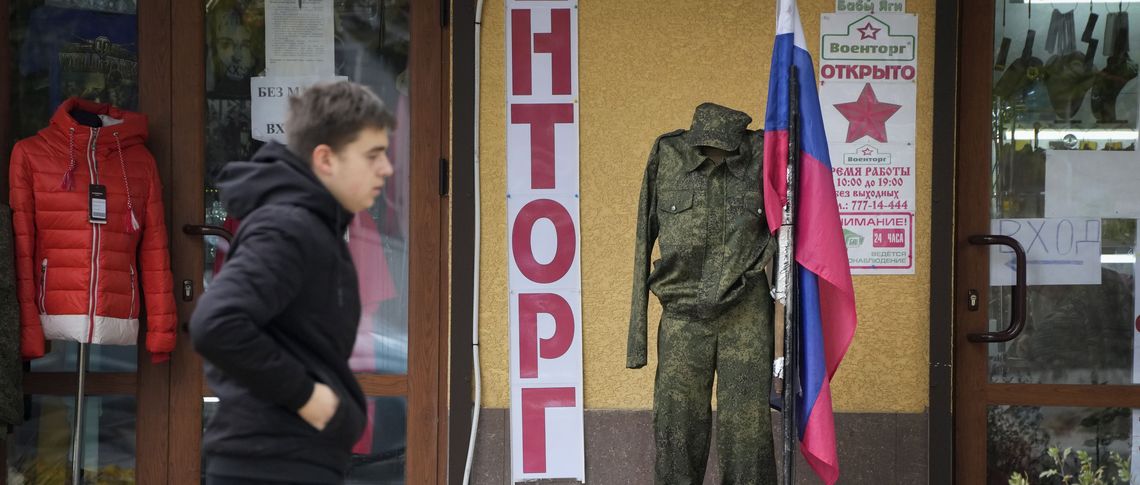From the outside, Transnistria looks like Russia's foothold in the region and the Kremlin's tool for achieving various, including military, goals. There are grounds to think this way. But the reality is more complicated and paradoxical.
Unrecognised Transnistria, which has not attracted attention for a long time, has loudly reminded the world of itself. On 28 February, deputies of all levels held a congress in Tiraspol and decided to ask Russia for help in connection with 'the deterioration of the economic situation in the republic caused by pressure from Moldova'. At the same time, they asked the UN, the OSCE, the CIS and even the EU to influence the Moldovan authorities.
The trigger was a series of steps that Chisinau has taken and plans to take in the future. The Moldovan side is gradually changing the reality in which Transnistria has become accustomed to existing — decades of unresolved conflict with Moldova.
This year Moldova intends to start charging Transnistrian companies a pollution fee and to ban cars with Transnistrian registration plates from travelling on national roads.
The first major change occurred in early 2023. Back then, the parliament adopted amendments to the Moldovan Criminal Code. It was supplemented with the article 'separatism'. This article did not exist, but now it hangs over almost every Transnistrian politician and official. From now on, 'acts committed with the purpose of secession of a part of the territory of the Republic of Moldova', 'incitement to separatism, as well as dissemination of materials and/or information inciting to separatism' are punishable by real prison terms.
Tiraspol criticised and still strongly criticises Chisinau on the 'separatism' clause in the Criminal Code. But the Moldovan authorities have gone further. In 2024, Moldova's new Customs Code came into force. It cancelled privileges for Transnistrian companies that had existed for years.
Adopted back in 1997, the Moldovan law 'On Customs Tariff' relieved 'economic entities located on the territory of the Republic of Moldova but having no tax relations with its budgetary system' from customs procedure fees for imports and exports. This cumbersome wording should be read as follows: the payments do not concern companies from Transnistria. This privilege is now gone. In addition, this year Moldova intends to start charging Transnistrian companies a pollution fee and to ban cars with Transnistrian registration plates from travelling on national roads. These measures are included in the government's action plan for 2024, but have not yet been implemented.
A lack of Russian support
Moldova's new Customs Code provoked a more nervous reaction from Tiraspol than the 'separatist' amendments to the Criminal Code. Rallies against Moldova's 'blockade' were held in Transnistria. They were meant to demonstrate popular indignation, but were too well organised to be considered a spontaneous local reaction to Chisinau's actions.
The apotheosis of indignation was the congress of deputies of all levels of the unrecognised republic, which took place on 28 February. It is worth saying that there was more ‘information noise’ prior to the forum. The international media was guessing whether Transnistria would ask to become a part of Russia or not. Especially since the date of the congress was close to 29 February, the day when Russian President Vladimir Putin addressed the Federal Assembly. It was believed that the congress in Tiraspol would decide to ask Moscow to join Russia, and Putin would grant the request the next day. Neither happened.
Putin did not even mention Transnistria in his speech. And the result of the Tiraspol congress was a loose document. It sharply criticised Chisinau and even veiledly confirmed the course of joining Russia - the declaration adopted by the congress says that the Transnistrian authorities are guided by 'the goals of implementing the will of the people expressed at all referendum'. All referendums - that means the referendum of 2006, at which 97 per cent of the residents of the unrecognised republic supported the course for its independence with subsequent accession to the Russian Federation.
Tiraspol intends to ask Moscow for 'the implementation of diplomatic measures to protect Transnistria in conditions of increasing pressure from Moldova’.
However, the response to the steps taken by the Moldovan authorities was not concrete actions, but a decision to send appeals all around. Transnistria will ask the UN, the OSCE, the CIS, the EU and the International Committee of the Red Cross (the appeals themselves are not yet available) to influence Moldova to prevent its pressure on the unrecognised republic, to return to negotiations, to prevent escalation on the Dniester, etc.
Tiraspol intends to ask Moscow for 'the implementation of diplomatic measures to protect Transnistria in conditions of increasing pressure from Moldova, taking into account the fact that more than 220 000 Russian citizens permanently reside on the territory of the Transnistrian Moldovan Republic'.
It is noteworthy that in the initial version of the declaration the protective measures were mentioned without clarifying that the reference was to diplomacy. This implied a broad interpretation of the request, up to military assistance. In the final text of the document, the request is made more specific, thereby shutting off conspiracy interpretations.
A multidimensional view
The bottom line? Transnistria became a news item and definitely attracted attention. But without sharp steps and radical decisions. The dystopian forecasts did not come true, but helped to draw the attention of a very wide audience to the congress. From an PR perspective the task was accomplished. In other respects, everything else is not so obvious.
Nevertheless, Tiraspol's recent actions should be analysed from several angles. Let's start with the Russian one. Russia's war against Ukraine has changed the situation for Transnistria for the worse. For Kyiv, the region has become a threat due to its loudly declared pro-Russianism, and also because of the presence of the Russian military - the peacekeeping contingent and the Operational Group of Russian troops (about a thousand troops in total). The Transnistrian segment of the Moldovan border with Ukraine has been closed since 2022. This means that imports and exports (70 per cent of Transnistrian exports go to the EU) can be carried out by the unrecognised republic only through Moldova, which has gained an important leverage over the region beyond its control. Thus, the war has made Transnistria's position more vulnerable.
Transnistria's appeal to Russia and the world gives Moscow an opportunity to declare that it is still a player here and to raise again the question of resuscitating negotiations.
Russia's own position on the Dniester has also deteriorated - it has weakened considerably. Chisinau has not been in contact with Moscow at any level for two years. Russia does not have the previous possibilities to provide political and diplomatic support to Tiraspol. International negotiations with Moscow's participation are no longer conducted: repeated attempts by the Russian side to restart the negotiation process in the '5+2' format (Chisinau and Tiraspol - parties to the conflict, OSCE, Russia and Ukraine - mediators, the US and the EU - observers) have failed. For obvious reasons, Kyiv is opposed to their restart. Chisinau assumes that business as usual is impossible while the army of one mediating country is bombing the cities of another. Transnistria's appeal to Russia and the world gives Moscow an opportunity to declare that it is still a player here and to raise again the question of resuscitating negotiations.
Another layer is the Moldovan dimension. In autumn, Moldova will elect a president. The country's current leader, Maia Sandu, is up for re-election for a second term. The pro-Western Sandu and her team have poor relations with Moscow: the president, the government and the ruling Action and Solidarity party fully support Ukraine and harshly criticise the Russian leadership. Russia, for its part, does not hide its negative attitude towards the Moldovan leader and supports Sandu's opponents. Moscow is interested in a change of power in the republic, and the current conflict between Chisinau and Tiraspol - albeit verbal, but loud enough - is a reason to accuse the Moldovan authorities of failing to ensure stability.
The value of an unrecognised status
Finally, the recent events have their own, intra-Transnistrian dimension. The unrecognised republic is also a business project. The local holding ‘Sheriff’, which is a monopoly in all profitable spheres from retail and wholesale trade to fuel, telecommunications, gambling and industrial production, has been operating for 30 years under the utmost comfort. 'Sheriff' influences political processes as well. The current Transnistrian leader Vadim Krasnoselsky was elected with the support of the company.
The change of the rules of the game that has begun cannot but alarm the Transnistrian giant. The congress should have shown that 'Sheriff' does not intend to give up its positions without resistance. But it is a careful resistance - the results of the congress speak for themselves.
'Sheriff' is run by pragmatic people who realise that sharp steps can worsen the situation. The owner of the holding Victor Gushan is a citizen of Ukraine (as, by the way, is the leader of the unrecognised republic Vadim Krasnoselsky). Gushan has assets in Ukraine and definitely has no desire to end up on the West's sanctions lists.
Although Transnistria is separated from Moldova by customs and border posts, the two banks of the Dniester are interdependent.
Although it is commonly believed that Transnistria follows the Kremlin's way, this is not the case. The local authorities, for example, have not once in two years supported Russia in its war with Ukraine, but have repeatedly emphasised that they accept and help Ukrainian refugees.
Transnistrian elites value the unrecognised status. On the one hand, it allows them to use free Russian gas (Tiraspol does not pay Gazprom for it - the company records the debt on Chisinau, but does not demand payment), on the other hand - to trade with the EU, without being subordinated to or dependent on Chisinau. This is how things were before Russia's invasion of Ukraine.
Being unresolved, the Transnistrian conflict has long ago acquired a bizarre form. Although Transnistria is separated from Moldova by customs and border posts, the two banks of the Dniester are interdependent. Moldova buys electricity from the Moldovan TPP located in Transnistria. Residents of the unrecognised republic receive Moldovan passports (along with Russian and Ukrainian ones) and travel to Chisinau to work, study, receive medical treatment and do shopping.
The Transnistrian football club 'Sheriff' - the name makes it quite clear who owns it - has won the Moldovan championship more than once and plays in European cups under the Moldovan flag. Finally, Transnistrians vote in Moldovan elections - parliamentary and presidential. Such features have not been inherent in any territorial conflict in the post-Soviet space. This does not mean that the existing structure cannot be broken if desired. But so far, no such desire is evident from anyone's side.






